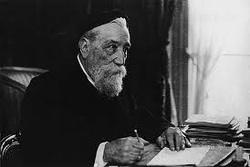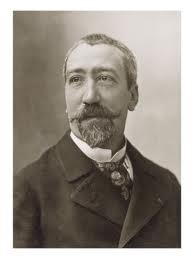
The novel featured the protagonist Sylvester Bonnard, who was a sceptical scholar. This character reflected Anatole France's self. The novel soon earned acclaim for its excellent prose. Anatole France won a prize from the French Academy. In addition, Anatole France wrote ‘In La Rotisserie de la Reine Pedauque’. This work criticised occult beliefs. In addition, in ‘Les Opinions de Jerome Coignard’ (1893), Anatole France was able to create the feel of the fin de siècle.
Anatole France participated in the resolution of the Dreyfus Affair. Dreyfus was an officer of the Jewish army who was convicted of espionage activity. Anatole France signed the manifesto of Emile Zola to support Dreyfus. Anatole France later wrote on the affair in ‘Monsieur Bergeret’, his novel published in 1901.
Among Anatole France's works is ‘L'Île des Pingouins’, published in 1908. This happened after the nearsighted character, Abbot Mael, mistakenly baptised them.
Anatole France's most famous novel is probably ‘La Revolte des Anges’, published in 1914. The story featured the guardian angel Aracade. Arcade guarded Maurice d'Esparvieu, but later fell in love. Furthermore, the angel decided to join a revolution of angels against God.
In 1921, Anatole France was given a Nobel Prize.
He was awarded the Nobel Prize in 1921. Anatole France died in 12 October 1924. He was then buried at the community cemetery in Neuilly-sur-Seine, near Paris.
In the 1920s, Anatole France’s works were put in the Roman Catholic Church’s Index Librorum Prohibitorum or Prohibited Books Index.
Anatole France participated in the resolution of the Dreyfus Affair. Dreyfus was an officer of the Jewish army who was convicted of espionage activity. Anatole France signed the manifesto of Emile Zola to support Dreyfus. Anatole France later wrote on the affair in ‘Monsieur Bergeret’, his novel published in 1901.
Among Anatole France's works is ‘L'Île des Pingouins’, published in 1908. This happened after the nearsighted character, Abbot Mael, mistakenly baptised them.
Anatole France's most famous novel is probably ‘La Revolte des Anges’, published in 1914. The story featured the guardian angel Aracade. Arcade guarded Maurice d'Esparvieu, but later fell in love. Furthermore, the angel decided to join a revolution of angels against God.
In 1921, Anatole France was given a Nobel Prize.
He was awarded the Nobel Prize in 1921. Anatole France died in 12 October 1924. He was then buried at the community cemetery in Neuilly-sur-Seine, near Paris.
In the 1920s, Anatole France’s works were put in the Roman Catholic Church’s Index Librorum Prohibitorum or Prohibited Books Index.

 RSS Feed
RSS Feed